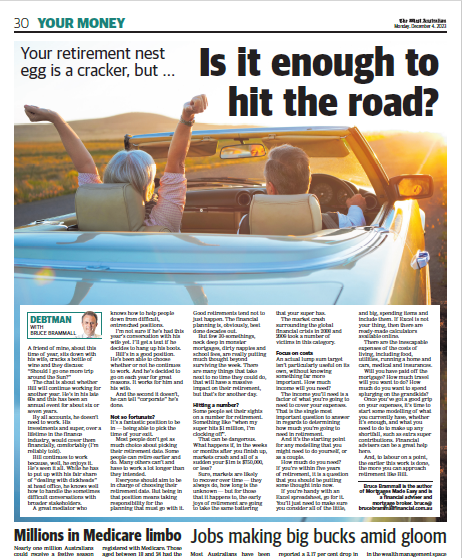
Bruce Brammall, The West Australian, 4 December, 2023
A friend of mine, about this time of year, sits down with his wife, cracks a bottle of wine, and they discuss: “Should I go one more trip around the sun?”
The chat is about whether Bill will continue working for another year. He’s in his late 60s and this has been an annual event for about six or seven years.
By all accounts, he doesn’t need to work. His investments and super, over a lifetime in the finance industry, would cover them financially, comfortably (I’m reliably told).
Bill continues to work because, well, he enjoys it. He’s seen it all. While he has to put up with his fair share of “dealing with dickheads” at head office, he knows well how to handle the sometimes difficult conversations with broader stakeholders. A great mediator who knows how to help people down from difficult, entrenched, positions.
Not sure if he’s had this year’s conversation with his wife yet. I’ll get a text if he decides to hang up his boots.
Bill’s in a good position. He’s been able to choose whether or not he continues to work. And he’s decided yes each year for great reasons. It works for him and his wife. And the second it doesn’t work for them, he can tell “corporate” he’s done.
Not so fortunate?
Fantastic position to be in. Being able to pick the time of your exit.
Most people don’t get as much choice about picking their retirement date. Some people can retire earlier and do. Many others can’t and have to work a lot longer than they intended.
Everyone should aim to be in charge of choosing their retirement date.
But being in that position means taking responsibility for the planning that must go with it. Good retirements tend not to just happen.
The financial planning is, obviously, best done decades out.
But few 30-somethings, neck deep in monster mortgages, dirty nappies and school fees, are really putting much thought beyond surviving the week?
(There are many things that take next to no time that they could do, that will have a massive impact on their retirement, but that’s for another day.)
Hitting a number?
Some people set their sights on a number for retirement. Something like “when my super hits $1 million, I’m clocking off”.
That can be a dangerous one. What happens if, in the weeks or months after you finish up, markets crash and all of a sudden your $1 million is $750,000, or less?
Sure, markets are likely to recover over time (they always do, how long is the unknown), but for those that it happens to, the early joys of retirement are going to take the same battering that your super has.
The market crash surrounding the GFC, in 2008 and 2009, took a number of victims in this category.
Focus on costs
An actual lump sum target isn’t particularly useful on its own, without knowing something far more important. How much income will you need?
The income you’ll need is a factor of what you’re going to need to cover your expenses.
That is the single most important question to answer in regards to determining how much you’re going to need in retirement.
And it’s the starting point for any modelling that you might need to do yourself, or as a couple.
How much do you need? If you’re within five years of retirement, it is a question that you should be putting some thought into now. If you’re handy with an Excel spreadsheet, go for it. You’ll just need to make sure you consider all of the little, and big, spending items and include them. If Excel is not your thing, then there are readymade calculators available online.
There are the inescapable expenses of the costs of living, including food, utilities, running a home and cars, medical, insurances, etc.
Will you have paid off the mortgage? How much travel will you want to do? How much do you want to spend splurging on the grandkids?
Once you’ve got a good grip on your expenses, it’s time to start some modelling of what you currently have, whether it’s enough, and what you need to do to make up any shortfall, such as extra super contributions. (Financial advisers can be a great help here.)
And, to labour on a point, the earlier this work is done, the more you can approach retirement like Bill.
Bruce Brammall is the author of Mortgages Made Easy and is both a financial adviser and mortgage broker. E: bruce@brucebrammallfinancial.com.au.
